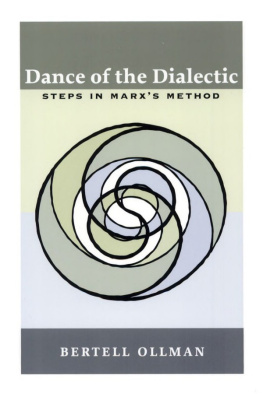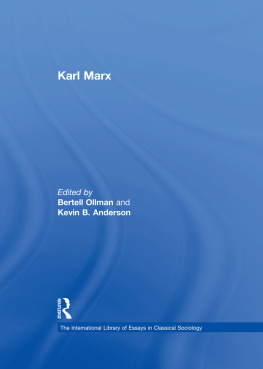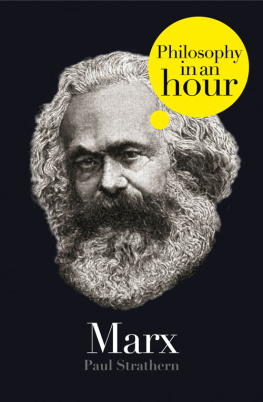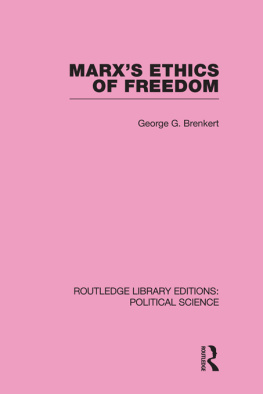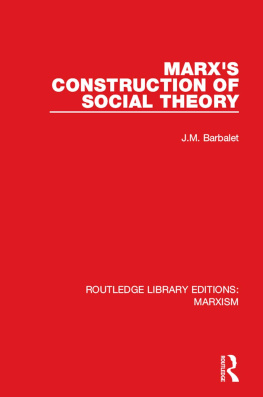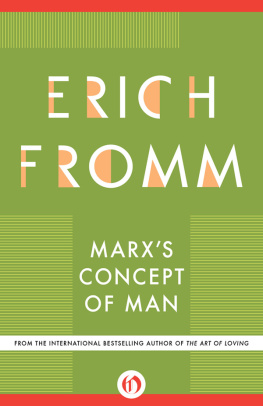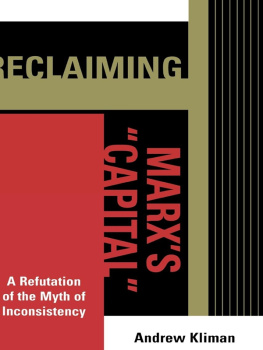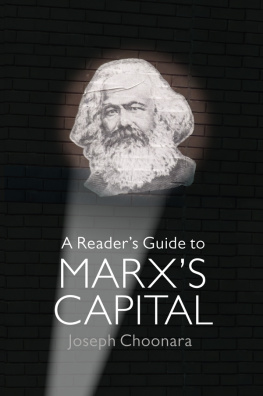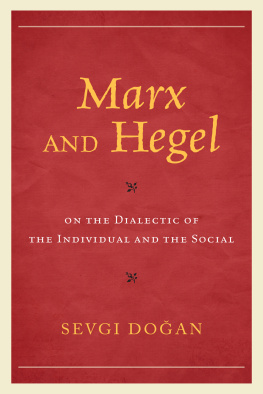This book is printed on acid-free paper.
Library of Congress Cataloging-in-Publication Data
Ollman, Bertell.
Dance of the dialectic: steps in Marx"s method / Bertell Ollman.
p. cm.
Includes bibliographical references and index.
ISBN 0-252-02832-5 (cloth: alk. paper)
ISBN 0-252-07118-2 (pbk. : aile paper)
1. Marx, Karl, 1818-1883. 2. Communism. 3. Dialectical materialism.
4. Philosophy, Marxist. 1. Title.
HX39.5.055 2003
335.4'11-dc21 2002151570
We must force the "frozen circumstances to dance by singing to them their own melody."
Acknowledgments
In the movie Bizarre, Bizarre, Claude Simon plays a famous Parisian mystery writer who gets all his best ideas for stories from his milkman, who tells them to his maid, who passes them on to Simon. While Simon never confesses, I feel the need to confess that I, too, have a milkman. And in this volume, which brings together the best of my life's work on dialectics, I should like to acknowledge the enormous contribution that Paule Ollman, my wife ... and milkman, has made to all my thinking and writing as a scholar and political actor for over forty years. Her insights, enthusiasms, and careful critical judgments are to be found in everything I've done. It delights me no end to publicly recognize her influence and her role as my full intellectual partner and to dedicate my book, which is really our book, to her. Of the many scholars who have contributed to my thinking on dialectics over the years, I also want to single out Bill Livant and thank him for all his questions and even some of his answers. Finally, I wish to thank Hani Zubida for all the flexibility and good cheer he showed in helping me prepare this manuscript for publication.
The chapters that comprise Dance of the Dialectic first appeared in the following publications and have been at least partly revised for inclusion in this volume:
Chapters 1, 5, and 6from my book Dialectical Investigations (New York: Routledge, 1993).
Chapters 2,3,4, and 7from my book Alienation: Marx's Conception of Man in Capitalist Society, 2d ed. (New York: Cambridge University Press, 1976); reprinted with the permission of Cambridge University Press.
Chapter 8from my book Social and Sexual Revolution: Essays on Marx and Reich (Boston: South End Press, 1979); reprinted with the permission of South End Press.
Chapter 9from Science and Society 62 (Fall 1998): 338-57; reprinted with the permission of S&S Quarterly, Inc.
Chapter 10from After Postmodernism: An Introduction to Critical Realism, ed. Jose Lopez and Garry Potter (London: Athlone Press, 2001), 285-98; reprinted with the permission of Continuum International Publishing Group, Ltd.
Chapter 11from New Dialectics and Political Economy, ed. Robert Albritton (Houndmills, England: Palgrave Publishers, 2002), 177-84; reprinted with the permission of Palgrave Publishers, Ltd.
Chapter 12from New Left Review 8 (Mar.-Apr. 2001): 73-98; reprinted with the permission of New Left Review, Ltd.
Introduction:
Marxism, this Tale of Two Cities
I
Marxism, understood as the ideas of Karl Marx and Frederick Engels, offers us a tale of two cities, one, which claims to have freedom but doesn't, and the other, which possesses bountiful freedom for all but few know where it is or how to get there. The first city is called "capitalism". In this city, whose institutions are widely viewed as the very embodiments of freedom, nothing is free. Everything costs, and most things cost more than those who need them can afford. For most of its citizens, what is called "freedom" is having the right to compete for things that remain just outside their grasp. But no one keeps them from competing or from thinking that one day they (or their children) may succeed.
The other city is called "communism". Here, people enjoy the freedom to develop their potential as human beings in peace and friendship with each other. Theirs is not the freedom to want what cannot be had but to do and be and become what they want. This city can't be found on a map, because until now it only exists in the shadows of the first city. It is, in effect, what capitalism could be, what it has all the means and conditions for becoming, once the inhabitants of capitalism overthrow their rulers along with the rules that organize life in their city. The rulers are the capitalist class, or those who own and control the means of production, distribution and exchange, and the principal rule by which they operate is profit maximization. The capitalists have managed to keep communism a well guarded secret by using their power over the mikefor in this society you need a microphone to be heardto ensure that no one learns that communism is really about freedom, while endlessly repeating the canard that something called "communism" was already tried in a few underdeveloped countries and that it didn't work.
There is a lot in Marxism, of course, that cannot be captured by this tale of two cities, but it does help to bring out the singular nature of Marx's subject matter: it is not capitalism, it is not communism, it is not history. Rather, it is the internal relations between all of these. It is how communism evolves as a still unrealized potential within capitalism and the history of this evolution stretching from earliest times to a future that is still far in front of us. Unaware of what exactly Marx has set out to study, most writers on Marxism, friendly and unfriendly, have great difficulty characterizing what he finds. For example, in so far as Marx describes and explains how capitalism functions, some writers consider Marxism a science. In so far as he presents capitalism as wanting, others insist that Marxism is essentially a critique of capitalism. In so far as he discovers a potential in capitalism for communism and outlines what that might look like, still others view Marx as mainly a visionary. And in so far as Marx advocates a political strategy for moving from here to thereand Lenin's question "What is to be done?" is always lurking somewhere in his consciousnessMarxism gets treated as a doctrine on how to make the revolution.
Science, critique, vision and strategy for revolution are ordinarily understood apart from one anothersome would even maintain that they are logically incompatibleand most interpreters of Marxism have emphasized only one or a couple of these themes while dismissing or trivializing the others (or, in some cases, using them as occasions to berate Marx for inconsistency). Yet, the evidence for the importance of all four currents in Marx's writings is very strong. Moreover, they are usually so intertwined and so mutually dependent that it is very difficult to separate them completely from each other. Hence, I am inclined to view Marxism as an unusual, perhaps unique, combination of all fourscience, critique, vision and recipe for revolutionand Marx himself therefore as a scientist, critic, visionary and revolutionary, with each of these qualities contributing to and feeding off the others.
The problem this raises, of course, ishow is this possible? How does one mix things that don't appear to mix? What allows Marx to construct theoriesfor this is what I am claimingthat are at the same time scientific, critical, visionary and revolutionary? For the tale of two cities presented above, this translates aswhat allows Marx to discover communism inside capitalism, and how does what he finds constitute both a criticism of capitalism and the basis of a strategy to overturn it? At the core of every science is a search for relations, especially for relations that are not immediately obvious, and in studying capitalism Marx uncovers relations between what is, what could be, what shouldn't be, and what can be done about it all. Marx finds all this, first of all, because it is there, but what permits him to find itwhile most students of capitalism only come up with the appearances (mislabeled as "facts")is his dialectical method. It is dialectics, and Marx's dialectics in particular, that not only allows him to knit together what most others consign to separate mental compartments but actually requires it.

